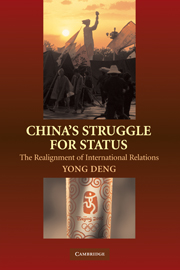Book contents
- Frontmatter
- Contents
- Figure and Tables
- Preface
- 1 Introduction
- 2 International Status and Chinese Foreign Policy
- 3 Negotiating the Human Rights Standard
- 4 Reacting to “China Threat Theories”
- 5 Strategic Partnerships with Russia, the European Union, and India
- 6 Independent Rivalry with Japan
- 7 Rediscovering Asia and Africa: The Multilateral Turn
- 8 Taiwan and China's Rise
- 9 China's Foreign Relations and the Emerging Great-Power Politics
- Index
3 - Negotiating the Human Rights Standard
Published online by Cambridge University Press: 05 September 2012
- Frontmatter
- Contents
- Figure and Tables
- Preface
- 1 Introduction
- 2 International Status and Chinese Foreign Policy
- 3 Negotiating the Human Rights Standard
- 4 Reacting to “China Threat Theories”
- 5 Strategic Partnerships with Russia, the European Union, and India
- 6 Independent Rivalry with Japan
- 7 Rediscovering Asia and Africa: The Multilateral Turn
- 8 Taiwan and China's Rise
- 9 China's Foreign Relations and the Emerging Great-Power Politics
- Index
Summary
Fixated on the target state's behavioral outcomes in human rights, political scientists studying the normative effect generally consider the People's Republic of China (PRC) as a failed case. Within the China studies community, the consensus recognizes Chinese responsiveness, albeit in varying degrees. China scholars tend to treat human rights as just one of the many issue areas in the PRC's foreign relations. And the focus is on the diplomatic tussle, the give-and-take over specific rights concerns. This approach parallels the U.S. policy debate in the 1990s over whether it should condition market access on human rights in dealing with China. As the linkage episode passed away, scholarly interest in the human rights issue waned at the outset of the new century.
These approaches underestimate the power of human rights. From our perspective, international human rights are not just another norm to be dismissed or bargained away. They are a constitutive principle of contemporary international society. In no small measure, they demarcate political boundaries and set standards for proper great-power behavior. In this sense, China's human rights problem has represented the political origin of its status conundrum after the cold war. This chapter explores this political effect and examines the PRC human rights diplomacy in the broad context of its struggle to overcome the political barriers against its great-power aspiration.
The violent end of the student demonstrations in Tiananmen Square in June 1989 immediately led to international condemnation and isolation against the Chinese Communist Party (CCP)–run government.
- Type
- Chapter
- Information
- China's Struggle for StatusThe Realignment of International Relations, pp. 69 - 96Publisher: Cambridge University PressPrint publication year: 2008



